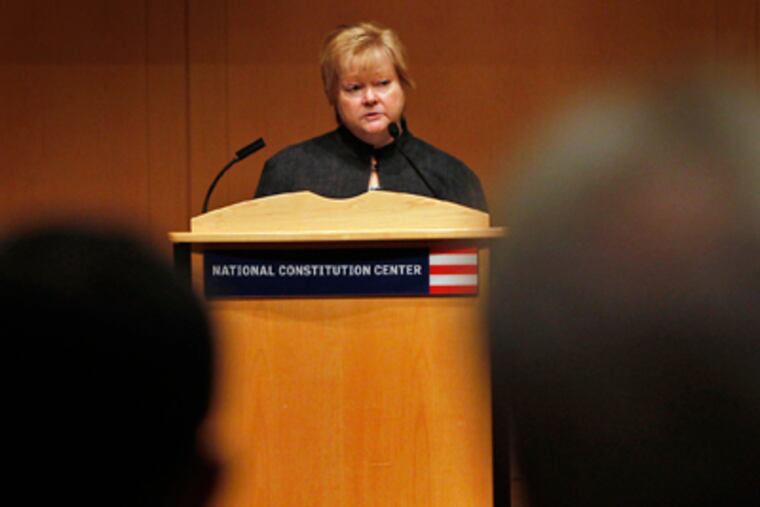Victim's mother speaks of importance of hate-crime laws
Judy Shepard, the mother of Matthew Shepard, a 21-year-old gay man who was beaten to death in 1998, shared her story Wednesday at the National Constitution Center and stressed the importance of hate-crime laws, specifically, the one named after her son.

Judy Shepard, the mother of Matthew Shepard, a 21-year-old gay man who was beaten to death in 1998, shared her story Wednesday at the National Constitution Center and stressed the importance of hate-crime laws, specifically, the one named after her son.
"It puts a face, a human story, on why we need this law, and as long as I am able to tell Matt's story to an audience where maybe there are people who aren't convinced how important this law is," Shepard said, "I want to make it clear that it's important."
Shepard spoke Wednesday at the hate-crimes conference for law enforcement and community leaders, which was sponsored by the Anti-Defamation League, the Department of Justice, and the National Constitution Center. The event aimed to educate attendees about what constitutes a hate crime and the affects of hate crimes, said Nancy Baron-Baer, associate director of the Anti-Defamation League regional office.
Hate crimes are "aimed at a trait, a prejudice that we can't run away from," Baron-Baer said. "It affects more than just the individual; it affects the entire community of people."
U.S. Attorney Zane David Memeger said Shepard's presence conveys the importance of the issue.
"Having Judy here to convey her story is important just to let people know that this is not an issue that's going away any time soon," Memeger said.
Before Shepard spoke, a video played featuring the experiences of both her family and the family of James Byrd Jr., an African American who was killed by three white men in 1998 in Texas in an unrelated incident.
Shepard's son was found tied to a fence on Oct. 7, 1998, in Laramie, Wyo., after he was pistol-whipped and beaten. He died five days later at a hospital in Colorado and both of his killers received two consecutive life terms.
Byrd was beaten by three men and chained to a truck before he was dragged for three miles, killing him. One of his killers received a life sentence, while the two others were sentenced to death. One was executed in September 2011.
In October 2009, President Obama signed the Matthew Shepard and James Byrd Jr. Hate Crimes Prevention Act. The legislation expands hate-crime law to cover actions motivated by the victim's perceived sexual orientation, gender identity, disability, or gender.
During her address, Shepard read her victim impact statement that she gave before the sentencing of Russell Henderson, the first of the two men tried for his murder.
"He was my son, my firstborn and more," Shepard said. "He was my friend and a constant reminder of how good life can be and ultimately how hurtful."
After the impact statement, she spoke about the relationship between law enforcement and the gay community.
"You took an oath to protect and serve everyone," said Shepard, directing her comments to the police officers in the audience. "You don't get to pick and choose, no matter your personal feelings."
Shepard, who serves as the board president of the Matthew Shepard Foundation, also spoke at several events in Philadelphia, Cherry Hill, and Wilmington.